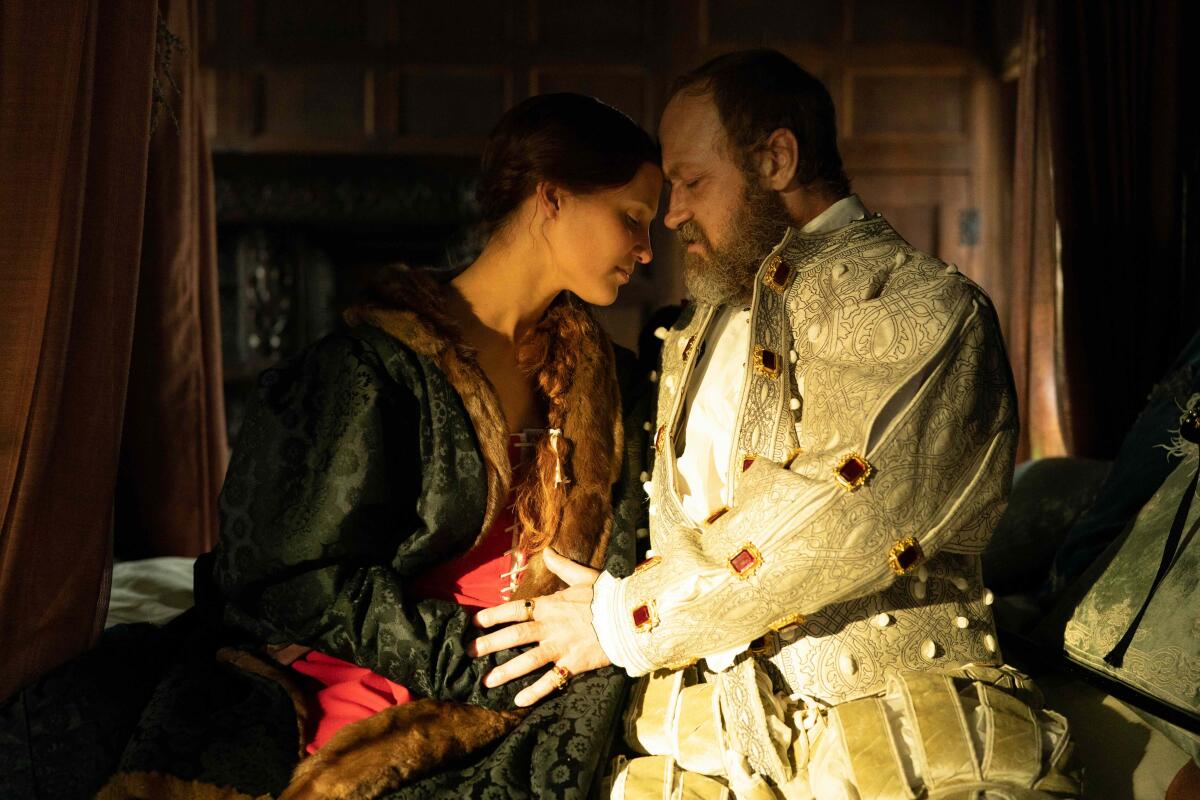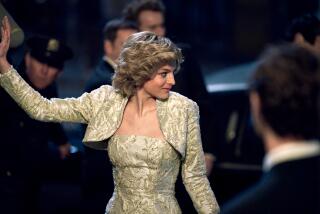Review: Jude Law rages through ‘Firebrand’ as a mercurial royal while Alicia Vikander hangs on

The worthy scouring of the past for hidden heroes, underrepresented figures and untapped dramatic potential has always kept historians and novelists dutifully occupied. One might think that England’s well-researched monarchs don’t belong in that category. But “Firebrand,” adapted from Elizabeth Fremantle’s novel “The Queen’s Gambit,” takes the position that Henry VIII’s final wife (of six), Katherine Parr, was more than just a devout, deferential nursemaid to an ailing king. She was also a closet Reformist radical and, in one eye-opening tweak to established history, an abused spouse not to be messed with.
Even if the facts don’t entirely support these notions, they’re not unappealing ones upon which to hang a portrait of a bad marriage at a turbulent time — despite the reality that Henry hardly requires outing as a serial #MeToo offender in need of comeuppance. And while it’s a tad surprising that Brazilian-Algerian art-house iconoclast Karim Aïnouz’s first English-language feature is a costume drama about English royals, it does sport two compelling stars in Alicia Vikander as protofeminist Katherine, and an almost unrecognizably heavy-set Jude Law as the Tudor tyrant.
That pairing, however, comes with drawbacks when the modernist screenplay (credited to Henrietta and Jessica Ashworth, along with Rosanne Flynn) meets Aïnouz’s meandering, atmosphere-thick approach. We drop in on Katherine in 1546 when she’s enjoying some interim power as newly appointed Regent while Henry is fighting France overseas. She risks treason, however, by meeting clandestinely in the forest with rabble-rousing Protestant preacher Anne Askew (Erin Doherty), eager for revolution against a vicious church authority that is afraid of commoners reading the Bible in English.
We’ve mapped out 27 of the best movie theaters in L.A., from the TCL Chinese and the New Beverly to the Alamo Drafthouse and which AMC reigns in Burbank.
Anne is skeptical that her old pal can do anything from within the castle walls, but Katherine’s optimistic rejoinder is, “I’ve lasted longer than any other wife.” That’s hardly the flex that it sounds. As a caring stepmother to Prince Edward (Patrick Buckley) and Princess Elizabeth (Junia Reeves), Katherine has brought a measure of peace to the kids’ traumatized lives but believes she was chosen by God to bring change. When Henry returns in deteriorating health, he brings to an already fearful court the full weight of his madness, paranoia, jealousy and rage, compounded by a festering leg wound. Apart from putting Katherine in immediate danger, it sparks a scramble for survival among his retinue, which includes heretic-hunting conservative bishop Stephen Gardiner (Simon Russell Beale) and Edward Seymour (Eddie Marsan), the Prince’s scheming uncle. Both men would be happy to see Katherine go the way of her beheaded predecessors if it means preserving their own power.
Vikander’s poised, considerate Katherine starts off active, but recedes into the background as the justifiably watchable tornado that is Law’s Oliver-Reed-channeling Henry transforms the movie into a biopic of a ruler’s howling exit. He becomes the central attraction of master cinematographer Hélène Louvart’s candlelit, sparingly saturated interiors. Previously collaborators on Aïnouz’s Cannes-winning “Invisible Life,” Louvart and the filmmaker work well together, especially when it comes to the rich colors and weighted textures of Michael O’Connor’s period wardrobe, or on any given close-up from a member of the superlative cast.
But Aïnouz, as if understandably drawn to an energy source, seems increasingly preoccupied with a mood of domestic terror at the expense of the story strands intended to paint Katherine as a vital inspirational bridge between her maniacal husband and her stepdaughter Elizabeth’s noteworthy womanhood. At a certain point, it feels as if scenes are missing, and what’s left reads as unconvincing. By the time “Firebrand” reaches its climactic dramatic license about this survivor narrative, we should be better armed to relish it, instead of scratching our heads at a speculative swerve out of nowhere.
'Firebrand'
Rating: R, for some violent content, brief gore and sexuality/nudity
Running time: 2 hours
Playing: Opens Friday, June 14 in limited release
More to Read
Only good movies
Get the Indie Focus newsletter, Mark Olsen's weekly guide to the world of cinema.
You may occasionally receive promotional content from the Los Angeles Times.











